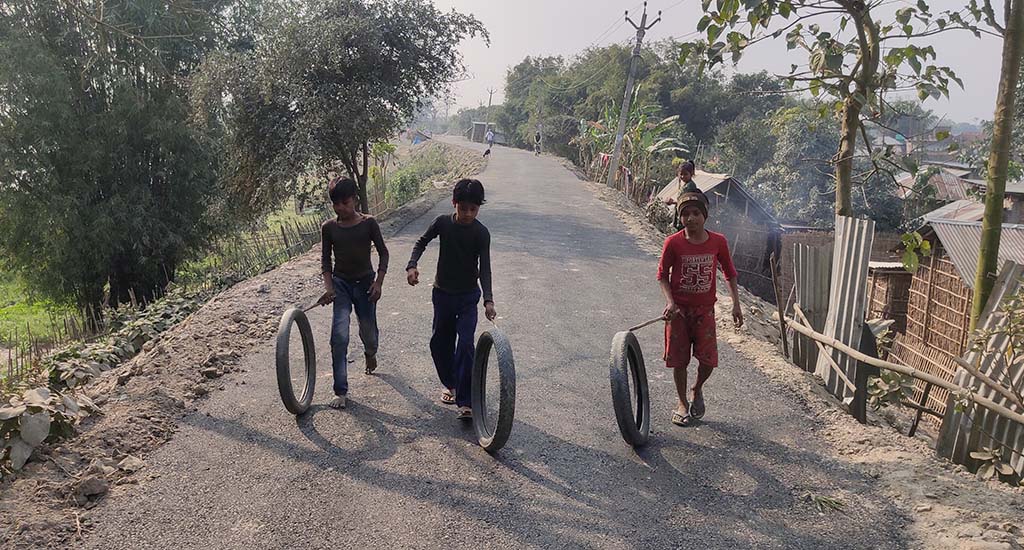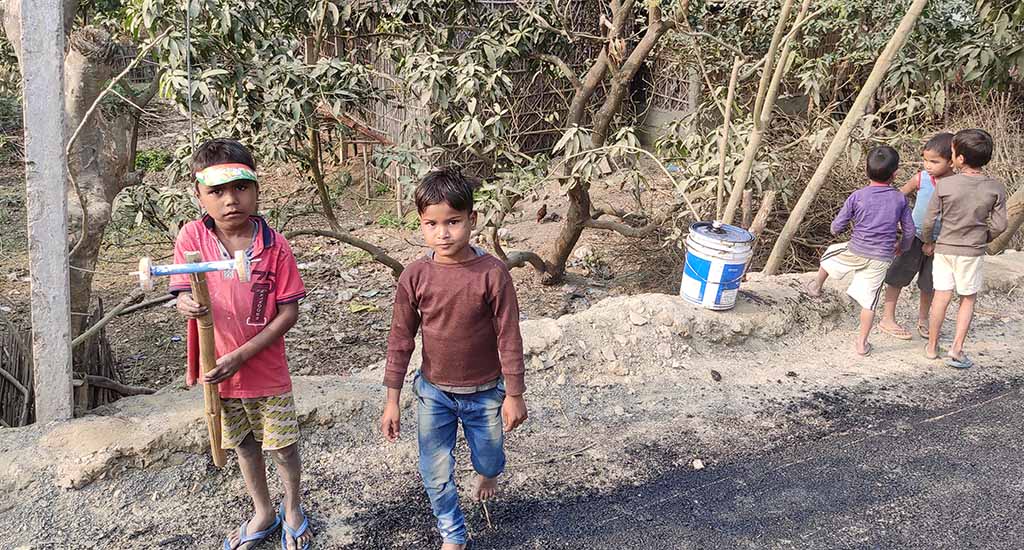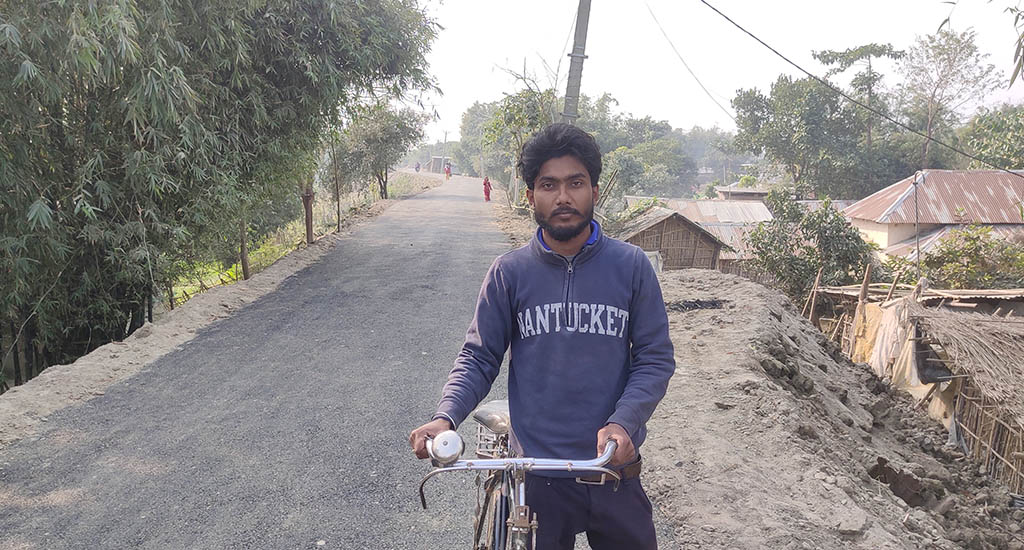Dashawa (Uttar Pradesh): Lakshmina Patel and her husband Haresh sold their two-year-old son Raja to a couple for Rs 20,000 on September 5. The two lived in Bhedihari Tola of the Dashawa village of the Kushinagar district in Uttar Pradesh.
Lakshmina had been admitted to a hospital and had just given birth to a baby girl. The woman running the hospital asked for Rs 4,000 to discharge her. The couple did not have a single penny. Haresh requested the villagers for a loan but no one gave him any money. Helpless, he sold his son through a middleman.
“When my daughter was born, the hospital authorities said that we will be allowed to take her home only after we deposit Rs 4,000. We had to give away our son for Rs 20,000 and three days after that we deposited Rs 4,000 in the hospital. When I went to the hospital I did not have any money. We hardly had anything to eat and survived on water. No one understands the helplessness which forced us to give away the boy. After the boy was taken away, we did not light the stove out of grief and remained hungry,” Lakshmina tells The Wire.
As per media reports, a local policeman investigating the case allegedly threatened Haresh and extorted Rs 5,000 from him. The accused policeman is now under investigation. However, to The Wire, Haresh said that the constable did not take Rs 5,000 from him – contrary to the reports.
Lakshmina is exhausted. “When we were in need, no one came to support us. But now everyone is coming forward. Some women even tell us that we should have been ashamed of selling the child. ‘How could we do it?,’ they ask. We have no answer. There is no answer to the question. We are completely silent.”
The middleman who sold the child, the couple who bought the child and the woman who ran the hospital have all been arrested and sent to jail. The cases are registered under various sections for criminal conspiracy, cheating, taking hostage and human trafficking.
Meanwhile, it has also surfaced that the hospital was being run illegally and has now been sealed.

The hospital where Lakshmina gave birth.
Kushinagar district magistrate Umesh Mishra and SP Santosh Kumar Mishra visited Haresh’s house. Former MLA Ajay Kumar Lallu and the current BJP MLA Dr Asim Kumar also met him.
Citing the incident as ‘heartbreaking’, Congress general secretary Priyanka Gandhi took to social media to express her concerns and question the efficacy of various government-run schemes. “Will selling of humans become the norm now to be able to survive in the country?” she asked.
The ordeal of Lakshmina and Haresh raises some serious questions: Why was a ration card not made for this family when they were struggling with hunger? Why was the Ayushman Bharat card with free treatment not issued to them? Why did Haresh have no work and why did he not have a MNREGS job card? Why were Lakshmina’s children not going to schools or Anganwadis? Why are poor people going to legal and illegal private hospitals instead of government hospitals? Is this just a matter of awareness or is it a failure of the government? While a family struggled for two meals a day, children cried out of hunger, why did no one in the society come forward to help?
Economic hardships
Haresh’s father Badri was a resident of Dhumnagar in West Champaran district of Bihar. He had four sons — Haresh, Awadhesh, Suresh and Dinesh. In search of work, Badri came to Dashawa village in Kushinagar district bordering Bihar. He spent his entire life working as a labourer here, but was unable to provide a better life for his sons.
All the four sons earn their livelihoods by working as labourers. Awadhesh and Suresh work in Panipat while Dinesh is a labourer in Rohtak. Out of the four, three brothers have straw houses. Only Dinesh has a two-room concrete house.
None of them own a piece of agricultural land. Badri had leased 12 kattha of land from the government, but was forced to sell it due to financial constraints.
Legally, leased land cannot be sold, but in Kushinagar district, there are frequent reports of the sale of leased land given to the poor by the government. Wealthy farmers take advantage of the poverty and debt of the lease holders and buy such land at cheap rates. Haresh’s mother lives with his younger brother.
Haresh’s house is in the fields. There is nothing in the thatched hut except a plank to lie on, a fan, a small gas stove and some clothes. There is a hand pump and a mud stove outside the house.

Haresh Patel’s house at a distance.
Near their hut, there is a tiny brick structure symbolising the dreams of Haresh and Lakshmina, who could not build a concrete house.
The 40-year-old Haresh worked as a daily wage labourer but he never earned enough to meet his family’s daily meal requirements. He kept slipping into debt. Currently, Haresh is under a debt of Rs 2 lakh lent by micro-finance companies. The amount of Rs 1.10 lakh he received under the Pradhan Mantri Awas Yojana (PMAY) was also spent on paying the interest of this loan.
Also read: Gender-Responsive Budgeting: Still a Long Way to Go For India
Haresh worked as a labourer at a brick kiln in Kubersthan for two years. He used to make Rs 160 per day for carrying 1000 bricks. When he lost his job there, it became difficult to get work daily. Now, he manages to find work only for 10-15 days in a month, earning Rs 300-400 in daily wages.
Haresh got 10 kattha land on lease for farming two years ago. He took a loan for the purpose but farming also started to cost him heavily as he did not have money for fertilisers, seeds and water. Eventually, he was forced to abandon farming.
Five years ago he got Rs 1.10 lakh for PMAY, of which Rs 10,000 was spent as ‘commission’, presumably to administrative officials. With this money he was able to lay the foundation of only two columns. The remaining amount was used to repay loans, while Rs 60,000 was spent on Lakshmina’s medical treatment.

Haresh Patel’s house.
Microfinance debt trap
Haresh and Lakshmina have since been caught in a debt trap.
When Haresh left farming, Lakshmina came in contact with a group of women. Microfinance companies showed her the dream of making her life better with loans. Between September and December 2023, Lakshmina and Haresh borrowed loans totalling over Rs 2 lakh from five microfinance companies. They attempted to pay instalments of one loan with the money from another loan, but in a few months all the cash was exhausted and they did not even have the money to pay the instalment.
Utkarsh Small Finance Bank lent a loan of Rs 30,000 to Lakshmina on November 18, 2023, which was to be repaid in 24 months with 25% actual interest. An instalment of Rs 740 was to be paid every fortnight. The microfinance company charged Rs 354 as processing fee, Rs 1,104 as other fees and Rs 750 as insurance fee for this loan. After deduction of these charges, she got only Rs 28,896 in hand, whereas she had to pay Rs 3,892 in 24 months including interest.
Lakshmina and Haresh have not been able to deposit amount towards this loan after April 2024.
Pahal Financial Services Private Limited gave Lakshmina a loan of Rs 46,200 on December 13, 2023, on which she had to pay 26% interest. An amount of Rs 2,300 was deducted from this loan in the name of a consumer fee and Rs 1,373 in the name of insurance. Lakshmina had to pay an instalment of Rs 2,500 every month. She could not deposit any after March 2024.
Spandana Sphoorthi Financial gave a loan of 42,000 to Lakshmina on September 30, 2023, which was to be repaid in 28 months through a monthly instalment of Rs 2,240. In these 28 months, they had to pay interest of Rs 12,262. This microfinance company took Rs 1,260 as insurance and Rs 496 as processing fee. This loan has also not been paid after April 9, 2024.

Some of the loan papers.
Fusion Microfinance gave Lakshmina a loan of Rs 45,000 on October 19, 2023 for buying cattle, which she had to repay in 25 months. To repay it she had to pay Rs 2,150 per month. They could only pay five instalments of this loan until February 2024.
IIFL gave a loan of Rs 45,000 to Lakshmina on October 13, 2023 at an effective interest rate of 29.02%. This loan was to be paid in 52 instalments of Rs 1,110 per fortnight. Lakshmina had last deposited a monthly instalment on May 30, 2024. No instalments have been deposited after that.
The question arises as to why microfinance companies were giving loans to Lakshmina and Haresh, when anyone who visited their house could see their abject poverty. One microfinance company has stated Haresh’s annual income as Rs 3 lakh in its documents. If loan payments are not deposited, the borrowers are subjected to physical and mental harassment. The poor who are already financially destitute are being drained further.
In rural areas, the debt trap of microfinance companies is now firmly a death trap for the poor. Several incidents of death by suicide by people entangled in such webs of debt are coming to light. In December 2023, a woman trapped in microfinance debt died by suicide in Mishrauli village of Sevarhi area in Kushinagar district.
Haresh has not been able to make any payments towards his loans since May this year. The agents of microfinance companies have started pressuring him. What was only starvation earlier has by now turned into a severe crisis of mounting debt from which he has found no way out.
Resigned to their fate
Meanwhile, Lakshmina got pregnant. By the time of the child’s birth, the household’s financial condition had deteriorated. Poverty and debt forced the couple to sell their child.
From the way Haresh and Lakshmina spoke, it seemed to this reporter that they had resigned themselves to the fate of having to give away one of their children even before they left for the hospital. Haresh said that before his wife was admitted in the hospital, he had told a labourer who had come to visit his family in the village to find someone to take the child.
According to Haresh, when his wife began to experience labour pains, he rushed her to Khushi clinic situated at the village intersection on September 3. On September 4, Lakshmina gave birth to a daughter.
“Madam (the hospital’s director) told me to deposit Rs 4,000 and take the child home. When I told her that I did not have money, she told me to take the child when I have the amount. We asked for a loan from two people in the village. Earlier also, I had taken a loan from these people at an interest rate of Rs 5 per hundred. Both of them refused to lend any more money,”said Haresh.
Then, he contacted the person with whom he had discussed selling his son. The person reached the hospital in an auto with three women and two men. He asked them to pay Haresh Rs 20,000, from which Rs 4,000 he deposited at the hospital. Lakshmina and their daughter returned home.
After this, the group of people who came to buy the boy took Haresh and his son Raja to Tamkuhiraj tehsil, where adoption papers were made. According to Haresh, he put his thumb impression on the papers as he is illiterate and handed Raja over to them.
Also read: The Modi Government’s Narrative Building on Jobs Is Just Not Succeeding
“When I handed Raja to them, he was crying a lot and refused to leave my lap,” recalled Haresh, his voice choking. “He is two years and two months old now. He is unable to speak properly. He kept on crying. Our hearts were heavy as stone. We also cried the whole night. The stove was not lit and we did not eat a single morsel. Our daughter Chhoti and sons Jalandhar and Mahavir started asking us about Raja. We lied to them and said that he had gone to his maternal uncle’s house,” he added.
“The next day a policeman came to our house and took me to the police station,” Haresh said, adding, “There he asked me how and why we sold our son. I was detained for one and a half hours. He gave me a piece of paper and asked me to put a thumb impression on it, after which I was allowed to go home. In the evening, five or six policemen came to our house in a jeep and took me to the police station. At the police station, I was asked where the boy was sold. I said that the boy had been taken away by people from Samaur. Since I did not have the number of those people, I gave them the number of the man who had mediated in selling the boy. The police went to his house that night and took him along to Samaur. Everyone including the child was brought to the police station. The child was given medicines at the block. Then he was taken to the district hospital. From there he was taken to another place (Child Welfare Committee) where again a paper was made and my thumb impression was taken. After that my son and I were sent home in an ambulance.”
“I could not think straight,” Haresh said, summing up the whole ordeal.
‘Everything is zero here’
Haresh and Lakshmina have four children — Jalandhar (six years), Mahavir (three and half years) and Raja (two years and two months) and the fourth child was born on September 4. They have named her Preeti.
This is Lakshmina’s second marriage and Haresh’s third. Lakshmina’s first husband died of illness. She had two daughters and a son with him. Lakshmina sent her elder daughter to live with her mother. The son who is 12-years-old and the younger daughter who is eight-years-old live with Haresh and Lakshmina.
Haresh’s first marriage took place 15 years ago. He had a daughter from his first wife. According to Haresh, his first wife left him due to financial constraints and took their daughter with her. Since then, he has met her only once. Later, he came to know that his daughter had got married.
After his first wife left, a villager arranged his match with a woman living in the neighbouring Rajapakar village. She was living separately from her husband and had three children. This marriage lasted two years, after which the two separated.
Haresh and Lakshmina got married seven years ago. Both of them have spent their entire lives in abject poverty and hunger.
The couple is happy to reunite with Raja but the worry of such a situation repeating itself in the future is writ large on their faces.
“As soon as the police handed over Raja to me, he ran and clung to me,” said Haresh. “On returning home, he remained at Lakshmina’s side for hours.”
“We had no hope that we will ever meet our son again. All this has happened thanks to you people. Can you get our house built too? And get us some money? We have been unable to get land on lease or a ration card till now. I had requested Pradhan ji for a ration card many times but nobody listened. Till date, nobody has given us anything. Today, two bags have come from an Anganwadi containing porridge, oil and masala. A day before, 35 kg of ration came,” Haresh said.
The Dasahwa village is located near the Amwa embankment of the Badi Gandak river. It is made up of nine hamlets and the population is no more than 5,000. One of the residents, Ramanand Patel told this reporter, “Look at our condition. Everything is zero here.”
Translated from the Hindi original by Naushin Rehman.


















